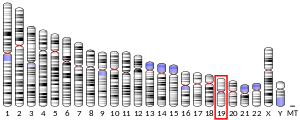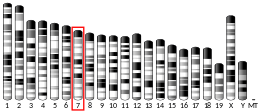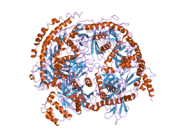Exosome component 5
Exosome component 5, also known as EXOSC5, is a human gene, which is part of the exosome complex.[5]
Interactions
Exosome component 5 has been shown to interact with:
gollark: We get lots of traffic to GTech™ `localhost` sites, so they have 784Zbps internet connectivity and hypercomputers.
gollark: <@319753218592866315>, in real IRL
gollark: However, æ.
gollark: The "elegant" way would be to store diffs or something.
gollark: However, things.
References
- GRCh38: Ensembl release 89: ENSG00000077348 - Ensembl, May 2017
- GRCm38: Ensembl release 89: ENSMUSG00000061286 - Ensembl, May 2017
- "Human PubMed Reference:". National Center for Biotechnology Information, U.S. National Library of Medicine.
- "Mouse PubMed Reference:". National Center for Biotechnology Information, U.S. National Library of Medicine.
- "Entrez Gene: EXOSC5 exosome component 5".
- Raijmakers R, Egberts WV, van Venrooij WJ, Pruijn GJ (Nov 2002). "Protein-protein interactions between human exosome components support the assembly of RNase PH-type subunits into a six-membered PNPase-like ring". J. Mol. Biol. 323 (4): 653–63. doi:10.1016/s0022-2836(02)00947-6. PMID 12419256.
- Raijmakers R, Noordman YE, van Venrooij WJ, Pruijn GJ (Jan 2002). "Protein-protein interactions of hCsl4p with other human exosome subunits". J. Mol. Biol. 315 (4): 809–18. doi:10.1006/jmbi.2001.5265. PMID 11812149.
Further reading
- Bonaldo MF, Lennon G, Soares MB (1997). "Normalization and subtraction: two approaches to facilitate gene discovery". Genome Res. 6 (9): 791–806. doi:10.1101/gr.6.9.791. PMID 8889548.
- Allmang C, Petfalski E, Podtelejnikov A, et al. (1999). "The yeast exosome and human PM-Scl are related complexes of 3' --> 5' exonucleases". Genes Dev. 13 (16): 2148–58. doi:10.1101/gad.13.16.2148. PMC 316947. PMID 10465791.
- Brouwer R, Allmang C, Raijmakers R, et al. (2001). "Three novel components of the human exosome". J. Biol. Chem. 276 (9): 6177–84. doi:10.1074/jbc.M007603200. PMID 11110791.
- Chen CY, Gherzi R, Ong SE, et al. (2002). "AU binding proteins recruit the exosome to degrade ARE-containing mRNAs". Cell. 107 (4): 451–64. doi:10.1016/S0092-8674(01)00578-5. PMID 11719186.
- Raijmakers R, Noordman YE, van Venrooij WJ, Pruijn GJ (2002). "Protein-protein interactions of hCsl4p with other human exosome subunits". J. Mol. Biol. 315 (4): 809–18. doi:10.1006/jmbi.2001.5265. PMID 11812149.
- Brouwer R, Vree Egberts WT, Hengstman GJ, et al. (2002). "Autoantibodies directed to novel components of the PM/Scl complex, the human exosome". Arthritis Res. 4 (2): 134–8. doi:10.1186/ar389. PMC 83843. PMID 11879549.
- Yang XF, Wu CJ, Chen L, et al. (2002). "CML28 is a broadly immunogenic antigen, which is overexpressed in tumor cells". Cancer Res. 62 (19): 5517–22. PMID 12359762.
- Raijmakers R, Egberts WV, van Venrooij WJ, Pruijn GJ (2002). "Protein-protein interactions between human exosome components support the assembly of RNase PH-type subunits into a six-membered PNPase-like ring". J. Mol. Biol. 323 (4): 653–63. doi:10.1016/S0022-2836(02)00947-6. PMID 12419256.
- Strausberg RL, Feingold EA, Grouse LH, et al. (2003). "Generation and initial analysis of more than 15,000 full-length human and mouse cDNA sequences". Proc. Natl. Acad. Sci. U.S.A. 99 (26): 16899–903. doi:10.1073/pnas.242603899. PMC 139241. PMID 12477932.
- Lehner B, Sanderson CM (2004). "A protein interaction framework for human mRNA degradation". Genome Res. 14 (7): 1315–23. doi:10.1101/gr.2122004. PMC 442147. PMID 15231747.
- Gerhard DS, Wagner L, Feingold EA, et al. (2004). "The status, quality, and expansion of the NIH full-length cDNA project: the Mammalian Gene Collection (MGC)". Genome Res. 14 (10B): 2121–7. doi:10.1101/gr.2596504. PMC 528928. PMID 15489334.
- Andersen JS, Lam YW, Leung AK, et al. (2005). "Nucleolar proteome dynamics". Nature. 433 (7021): 77–83. doi:10.1038/nature03207. PMID 15635413.
- Rual JF, Venkatesan K, Hao T, et al. (2005). "Towards a proteome-scale map of the human protein-protein interaction network". Nature. 437 (7062): 1173–8. doi:10.1038/nature04209. PMID 16189514.
- Zhou H, Zhang D, Wang Y, et al. (2006). "Induction of CML28-specific cytotoxic T cell responses using co-transfected dendritic cells with CML28 DNA vaccine and SOCS1 small interfering RNA expression vector". Biochem. Biophys. Res. Commun. 347 (1): 200–7. doi:10.1016/j.bbrc.2006.06.093. PMID 16815301.
- Olsen JV, Blagoev B, Gnad F, et al. (2006). "Global, in vivo, and site-specific phosphorylation dynamics in signaling networks". Cell. 127 (3): 635–48. doi:10.1016/j.cell.2006.09.026. PMID 17081983.
This article is issued from Wikipedia. The text is licensed under Creative Commons - Attribution - Sharealike. Additional terms may apply for the media files.






